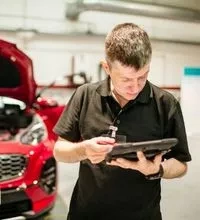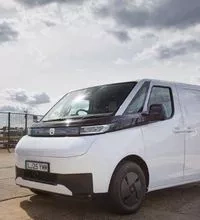Four visions of the future of transport
In this article: Air quality, emissions, electric vehicles, self-driving vehicles. A pioneering automotive industry leader shares views on future challenges and opportunities
After 50 years in the automotive industry, I find myself reflecting on change over those decades and the challenges we now face.
Success as an industry has brought us so many benefits. So compelling is the proposition to customers that in most countries around the world, over 90% of all passenger and goods kilometres travelled takes place in our products – rail is four per cent, bus is three per cent, and cycling and walking is the rest. We're not allowed to use the word ‘dominant’, but I think the market share speaks for itself.
However, the sheer scale of our success has brought challenges; societal challenges that we all know and need to address. We know what they are.
Air quality
Mitigating climate change and global warming. This has stimulated massive industry innovation. We're not going to get to the carbon dioxide targets without switching out of fossil fuels over time. Mostly electricity will be the replacement, but not only electricity – hydrogen will play a role.
Emissions
Based on the emerging evidence of health issues, city air quality needs cleaning u, too. What's amazing is that the latest Real Driving Emissions (RDE) test results, independently conducted, show modern diesels registering almost zero nitrogen oxide emissions. Can you believe that? The government meanwhile rushes ahead to say that diesel is terrible, but engineers don't just listen – instead, they innovate, they solve the problems. Whether it's too late now to save the diesel, reputationally, we can debate, but the technology now is unbelievable.
Electric vehicles
We know that electric vehicles are increasingly incredible products. Tesla, Nissan, BMW all pioneered this and proved it works. But there's so much left to be done: charging, energy efficiency, energy capacity, density, cost of batteries, and so on. We have huge work to do. I'm engaged in trying to help that in the UK.
Self-driving vehicles
Lastly, we know that self-driving vehicles are coming. We can only debate when, not if. It's a bigger revolution than electric vehicles, by far, in terms of the impact on society. Not only that, but all cars are permanently connected on high-bandwidth connectivity. This is all going on in the technology space, but meanwhile consumers are also changing. With increasing urbanisation – more and more people living in cities – transport needs to change, and mobility becomes a service rather than a product.
The implications of all this are enormous. Think of society's standard for safety on trains and aerospace: it is very demanding because the customer has surrendered control [to automated systems].
In cars we, somewhat illogically, we tolerate much higher levels of damage to people. But this will change. When cars are automated, the same standards will apply to cars and fleets of cars as currently apply to trains and planes. That means we need to upskill our people to deal with these operations with the same integrity you would expect in aeroplane technology.
These are exciting times, but the stakes have never been higher.
Richard Parry-Jones CBE joined Marshall Motor Group Holdings in January 2019 as non-executive chairman. He previously spent more than 30 years in senior executive positions at Ford Motor Company, including as group vice-president of global product development, and he served as its chief technical officer for ten years.
This article is an edited extract of Richard's speech to the IMI Annual Dinner in March 2019 where he was presented with the Sue Brownson award. A huge thank-you to our fabulous Annual Dinner sponsors, including headline sponsor Remit Group. Thanks to you all: SnapOn; London Motor & Tech Show 2019; Shell Helix Ultra; Saffron Insurance; Autotech Recruit; Alphera; Enterprise Rent-a-Car; BNP Paribas Cardif.
To get involved with the IMI's centenary Annual Dinner in 2020, contact Wendy Hennessy.




